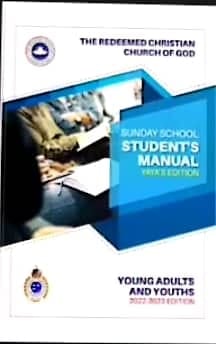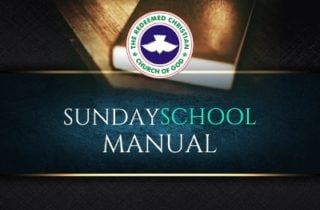
RCCG YAYA Sunday School Students Manual 25 November 2022 Lesson 17 – Leadership: Means And Roles
Click HERE for Previous RCCG Sunday School Teacher Manual
TOPIC — Leadership: Means And Roles (RCCG Sunday School Manual For Young Adults And Youths (YAYA)
MEMORY VERSE: “Discretion will preserve you; Understanding will keep you,” – Proverbs 2:11 (NKJV)
BIBLE PASSAGE: Genesis 41:38-41 (KJV) (Scroll down for RCCG Sunday School 25 December 2022 HYMN)
38 And Pharaoh said unto his servants, Can we find such a one as this is, a man in whom the Spirit of God is?
39 And Pharaoh said unto Joseph, Forasmuch as God hath shewed thee all this, there is none so discreet and wise as thou art:
40 Thou shalt be over my house, and according unto thy word shall all my people be ruled: only in the throne will I be greater than thou.
41 And Pharaoh said unto Joseph, See, I have set thee over all the land of Egypt.
Also Read:
– RCCG Sunday School Teacher Manual 25 December 2022: Divine Leading And Guidance (Pt 2)
– RCCG Sunday School Student Manual 25 December 2022 – Divine Leading And Guidance (Pt 2)
– RCCG YAYA Sunday School Teacher Manual 25 December 2022 – Leadership: Means And Roles
– Open Heaven 25 December 2022 – Divine Love I
INTRODUCTION: Having discovered what leadership is and certain theories of leadership with biblical instances, we need to find out how to become leaders as Christians. Equally, based on the situational theories of leadership, the role of team leaders should evolve as team develop through different stages. Effective leaders are aware of the stages and carry out the necessary actions required at each stage that will enable the team to be successful.
LESSON OUTLINE
- MEANS OF BECOMING LEADER
- THE ROLE OF LEADERS
1. MEANS OF BECOMING LEADER
There are various means of attaining leadership positions. These means includes:
- Qualification: some people become leaders because they achieve the necessary certification or credentials for a position, e.g Vice-chancellor, Judges, etc. (Daniel 1:17-20).
- Merit: Some people become leaders primarily through faithful and enthusiastic participation as well as competent performance over time. These leaders may be considered to have “paid their dues” (1Samuel 17:31-37). E.g. students Union leaders.
- Capturing: some people become leaders by campaigning for a position being political, or otherwise maneuvering themselves into a position. Leaders in this category may also take possession or seize the position through positive or negative means. E.g. politicians, military dictators, etc. (2 Samuel 15:6).
- Identification: Some people become leaders because they possess personal or professional qualities that are recognised as beneficial and undeniable and are appropriate for meeting the team’s need at a particular time (Genesis 41:38-41). E.g. project manager of a business course representatives, etc.
- Default: Some people become leaders simply because other team members are unwilling or unable to accept the position of responsibility. An example is someone in a small discussion group to lead the discussion (1 Samuel 17:10-11, 32).
- Heritage: some people become leaders simply because they come from a privilege family or ruling class. E.g. children of great business owners, royal descendants, etc. (1Chronicles 19:1)
The categories also overlap, resulting in many ways that someone can attain a leadership position. Leaders can perform as I levels and make valuable contributions to their teams, regardless of how they were selected or designated as a leaders.
2. THE ROLE OF LEADERS
Certain situations that effective leaders need to be aware of and the actions they can take to deal with them at the various stages of team development are briefly outlined below:
- Forming: Leaders play a dominant role at this stage. Leader should provide the team with clear direction and establish easily identifiable and understandable objective/outcomes Exodus 4:29-31).
- Storming: Leaders needs to help team members overcome feelings of discomfort and be aware of any members who may feel overwhelmed (Ephesians 4:31-32). Leaders work to resolve conflicts and build a good relationship between team members. Leaders needs to remain positive and firm in the face of challenges to their leadership or to the team’s goal (Numbers 16:1-3)
- Norming: Team members come to respect the leader’s authority and some members demonstrate leadership in specific areas. Team leaders can take a step back from the team at this stage as individual members take greater responsibility (Exodus 18:14-17). This is also when a team hierarchy was established.
- Performing: The leaders are able to delegate much of the work and can concentrate on developing the skills and abilities of individual team members (Exodus 18:21). Leaders should organise “get together/fun time” as much as possible with a view to celebrate success once the team has achieved high performance. Being a part of the team at this stage feels easy and comfortable compared to the early stages.
- Adjourning: Team may organise a celebratory event at the end of a project. Team members will likely leave with fond memories of their experience.
CONCLUSION: You should influence people around you positively.
QUESTIONS:
- Mention five of the various means of attaining leadership position.
- What are the five actions that characterize the role of a leader?
SUNDAY SCHOOL HYMN
- O Sunday School, on the Lord’s day,
O how I love Thee well,
I am happy, it makes me glad
To rejoice at Thy birth. - O Sunday School, on the Lord’s day,
Thy friend friendship suits me well,
Both young and will sing Thy song,
We long for Sunday School. - O Sunday School, on the Lord’s day,
Christ was Thy first teacher,
The Holy Spirit, great teacher,
Does manifest in thee. - O Sunday School, on the Lord’s day,
This testimony is sure,
That God, the Father Almighty,
Poured His blessing on Thee - O Sunday School, on the Lord’s day,
Though the sun be so bright,
Or if the clouds be black with rain,
I’ll be in Sunday School. - O Sunday School, on the Lord’s day
I rejoice to see Thee,
Will thou pass over me today?
Without my being blest?




